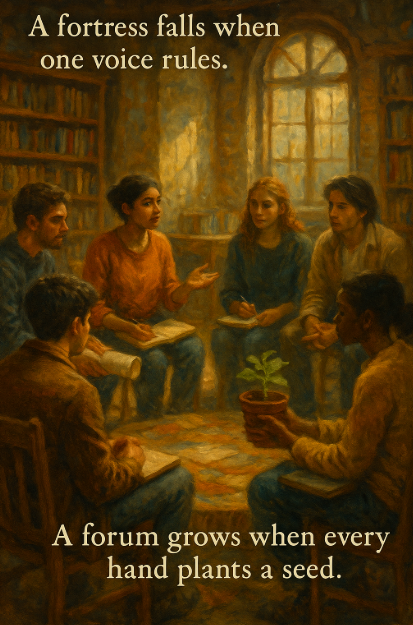
The first meeting of the Student Stewards’ Forum was not held in the council chamber. The very air in that room, they decided, was still thick with the dust of old arguments. Instead, they gathered in the library, in the very heart of the storm’s aftermath.
Sunlight streamed through the tall, now-repaired windows, illuminating motes of dust that danced like tiny, celebrating spirits. The space was not yet fully restored, but it was alive. Student-made shelves, built from salvaged wood and Mateo’s reinforced joints, held books that smelled faintly of damp and hope. The scar of the collapsed ceiling was now a vast, beautiful patchwork of new drywall, waiting for the Arts Collective to paint a mural across it—a design voted on by the whole school.
The first gathering of the Student Stewards’ Forum began not with a gavel, but with the scrape of chairs pulled into a wide circle. No podium, no dais. Just a ring of faces, some still wary, some newly lit with curiosity. Emil sat with Priya, Sam, Aisha, Leo, Mateo, Kai, and others whose names had begun to fill the ledger’s pages. Lara entered quietly, not carrying a banner, not wearing gold. She sat on the edge of the circle, waiting—not to be deferred to, but to be heard in turn.
The first item was the compost proposal. Leo presented it, not with flashy slides, but with a bucket of the rich, dark, finished compost produced from the school’s food waste over the last month. He passed it around. Students dipped their hands in, feeling its texture, smelling its deep, earthy scent.
“It reduces waste. It feeds the garden. It teaches us cycles,” he said, his voice clear. “The outcome is healthier soil. The metric is… this.” He held up a handful.
A hand went up—a younger student from the math club. “Could we track the reduction in trash bag usage? Quantify the savings?”
Leo grinned. “Yes. We could.”
The proposal was approved, not by a vote, but by a murmur of consensus. It was recorded in the ledger.
Next was Priya. She stood, not to debate, but to partner. She and the Robotics lead presented a plan for a peer-mentoring system, pairing older students with younger ones based on interest, not test scores. “The metric,” Priya said, “will be the number of partnerships formed and sustained. The outcome will be visible in the hallways.” She nodded to a sketch by Aisha that showed two students, one tall and one small, working on a bot together under the fig tree.
There were murmurs of approval. No hands raised in authority, only nods, small questions, the slow weaving of consensus.
Then, a pause. Lara looked at her notes, then around the circle. She took a breath.
“I have a proposal,” she said. Her voice was quieter than it used to be, stripped of its performing cadence. “I… I thought of calling it the First Roots program.” She laid out a plan for seniors to teach practical skills to younger students—basic gardening, simple repair, planting, how to read a blueprint, how to navigate a debate without personal attack. Things that last. “The curriculum is here,” she said, handing a sheaf of papers to Elias. It was meticulous, detailed, and collaborative, with sections contributed by Mateo, Mrs. Nouri, and even a note from Kai on documenting progress.
She did not argue for it. She simply presented it, then waited.
A pause. Then Aisha said, “Roots that spread.” And Priya, after a beat, added, “I would support that.” The circle murmured assent. The idea was taken, not as Lara’s decree, but as seed for them all.
Grandfather watched from a comfortable armchair in the fiction section, a book open but unread on his lap. His eyes were on the circle, on the easy way ideas were offered and shaped by the group. Emil came over to him, a question in his eyes about the mentoring budget.
“You pruned the dead branches,” Grandfather said softly, his gaze sweeping the sunlit room. “Now see how the light reaches the forest floor.” He nodded toward the circle, where a shy freshman was now suggesting a water-collection system for the greenhouse roof. “Before, only the tallest trees thrived. Now, every sapling gets its share of sun.”
Emil looked back at the Forum. He saw Lara listening intently to the freshman, actually listening, her pen poised to note down the idea. He saw Priya and Leo already sketching out a collaboration between debaters and coders. He saw the ledger, filling with the living history of their collective will.
He had expected to feel a sense of victory, of hard-won power. But he didn’t. He felt something quieter, more profound: redundancy. The system no longer depended on him. It had its own rhythm, its own light, its own growing canopy.
The meeting adjourned without a gavel. It just… ended, as conversations do, with students drifting off in pairs and trios, still discussing plans, carrying tools, heading to the greenhouse to implement what they’d just agreed upon.
Emil stayed behind for a moment, straightening chairs. He looked at the circle of empty seats, the ledger left open on the stool for anyone to add to. He looked at the patch of new drywall on the ceiling, waiting for its art.
The shadow of the old council was gone. In its place, the wide, dappled, and welcoming shadow of the canopy. It didn’t command. It sheltered. It didn’t direct growth. It made growth possible.
The fortress was forgotten.
The forest was now home.

